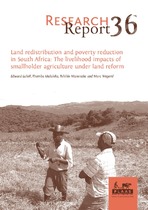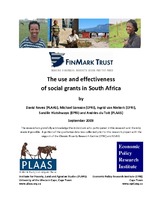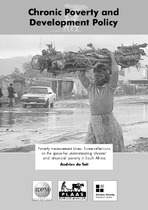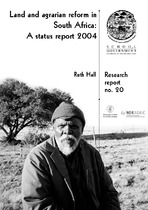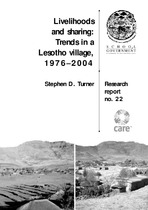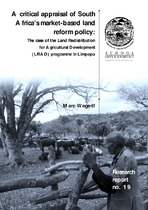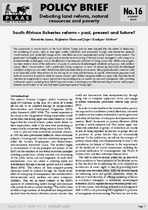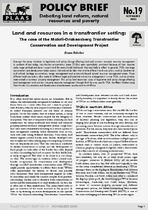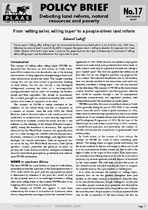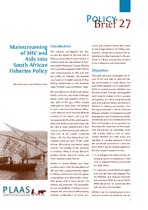Search
Now showing items 31-40 of 57
Land redistribution and poverty reduction in South Africa: The livelihood impacts of smallholder agriculture under land reform
(Institute for Poverty, Land and Agrarian Studies, University of the Western Cape, 2007)
Since its inception in 1994, South Africa’s land
reform programme has aimed to achieve multiple
objectives, including redressing the historical
racial imbalance in landholding, alleviating poverty
and developing the ...
The use and effectiveness of social grants in South Africa
(Institute for Poverty, Land and Agrarian Studies, University of the Western Cape, 2009)
This research examines the effectiveness of social grants in South Africa, and how recipients use
their grants. As a form of social protection, social grants not only ameliorate poverty and
provide a safety net, they ...
Poverty measurement blues: Some reflections on the space for understanding ‘chronic’ and ‘structural’ poverty in South Africa
(Institute for Poverty Land and Agrarian Studies (PLAAS), 2005)
This paper explores the challenge of understanding chronic and structural poverty in South Africa, and questions the dominance of the econometric imaginary in present-day development and poverty studies. It argues that ...
Land and agrarian reform in South Africa: A status report 2004
(Institute for Poverty, Land and Agrarian Studies, University of the Western Cape, 2004)
This is the third in a series of ‘status
reports’ on land and agrarian reform
in South Africa published by the
Programme for Land and Agrarian Studies
(PLAAS). These reports set out to assess
progress, problems and ...
Livelihoods and sharing: Trends in a Lesotho village, 1976–2004
(Institute for Poverty, Land and Agrarian Studies, University of the Western Cape, 2005)
In 2004 I was fortunate enough to be able
to return to Ha Tumahole, the village
in Lesotho where I undertook research
on farming and livelihoods in 1976–77,
and spend four weeks learning about what
had changed in ...
A critical appraisal of South Africa’s market-based land reform policy: The case of the Land Redistribution for Agricultural Development (LRAD) programme in Limpopo
(Institute for Poverty, Land and Agrarian Studies, University of the Western Cape, 2004)
In 1996 less than 1% of the population
owned and controlled over 80% of
farm land. This 1% was part of the
10.9% of the population classified as white
(Stats SA 2000). Meanwhile, the 76.7% of
the population that is ...
South African fisheries reform – past, present and future?
(Institute for Poverty, Land and Agrarian Studies, University of the Western Cape, 2004)
Two approaches to transformation of the South African fishery industry were adopted after the advent of democracy:
the broadening of access rights to new rights holders (individuals and companies) through state intervention ...
Land and resources in a transfrontier setting
(Institute for Poverty, Land and Agrarian Studies, University of the Western Cape, 2005)
Amongst the many initiatives in legislative and policy change affecting land and common property resource management
in Southern Africa today, transfrontier conservation areas (TFCAs) seem particularly prominent because ...
From ‘willing seller, willing buyer’ to a people-driven land reform
(Institute for Poverty, Land and Agrarian Studies, University of the Western Cape, 2005)
The concept of ‘willing seller, willing buyer’ has dominated the discourse on land reform in South Africa since 1994. Now,
following the national Land Summit of July 2005, it appears that government is willing to abandon ...
Mainstreaming of HIV and Aids into South African Fisheries Policy
(Institute for Poverty, Land and Agrarian Studies, University of the Western Cape, 2008)
This research investigated the drivers
and the impact of HIV and Aids in
fishing communities in South Africa, in
order to assist the Department of Environmental
Affairs and Tourism: Marine
and Coastal Management ...

